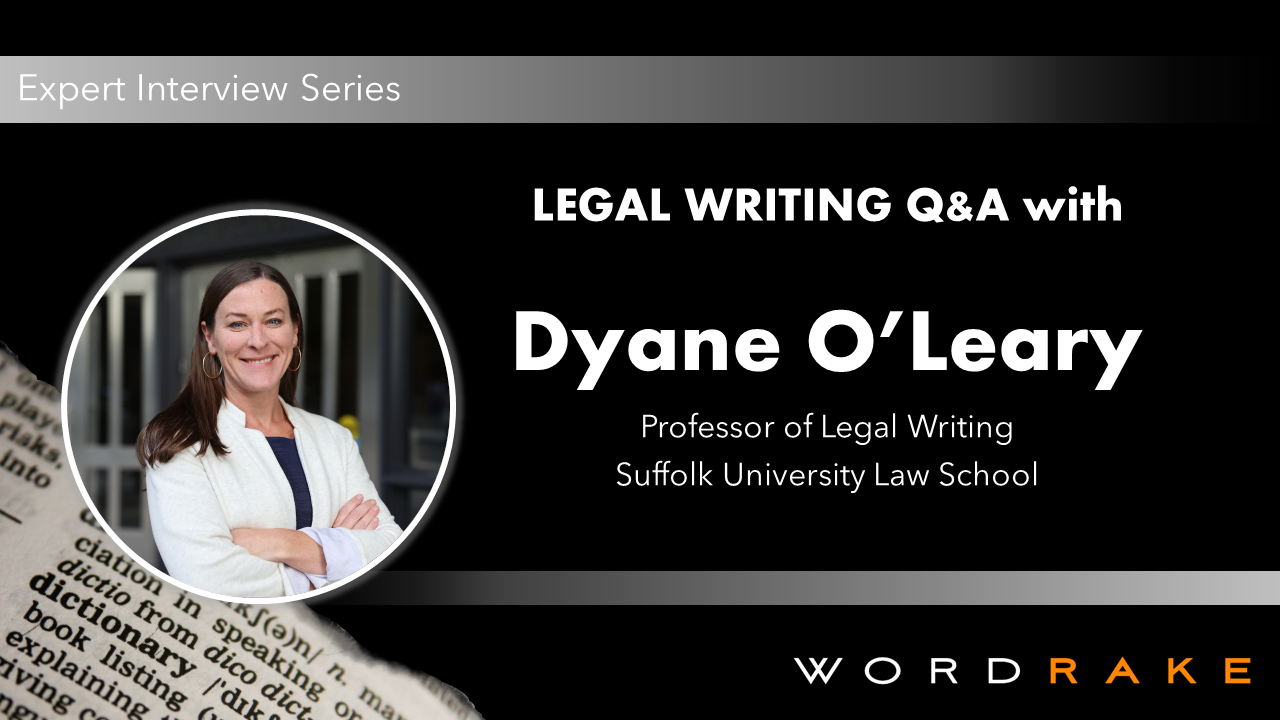Legal writing is all about precision and balance. Creating legal documents calls for precision and attention to detail, while requiring creative thinking and reasoning at each step. This can be hard for law students to manage, which is why Professors like Dyane O’Leary dedicate their lives to molding new legal minds. For her, the delicate dance between structure and innovation is a joy to lead.
What is your role and how did you get to where you are today?
I am a Professor of Legal Writing and Director of the Legal Innovation & Technology Institute at Suffolk University Law School in Boston, MA. As a former litigator and law clerk, I was always interested in analyzing the practice of law—more than actual practice itself! The planning, the writing, the organization, the technology, the communication. So I left practice to teach and haven’t looked back. It’s a privilege bring the evolving nuts & bolts of lawyering to the next generation of modern lawyers through courses such as Legal Practice Skills, Generative AI for Lawyers, and Modern LPS Innovation & Technology. I’m grateful to have been recognized with a Fastcase 50 award, and included as a fellow with the College of Law Practice Management and on the ABA’s Women of Legal Tech list. My 2022 book, Legal Innovation & Technology: A Practical Skills Guide for the Modern Lawyer, was the first student-centered book of its kind.
What is the most frustrating part about becoming a good legal writer? How do you overcome it?
I’ll answer this question by sharing my students’ number one frustration over the years after being introduced to legal writing: the balance (clash?) between rigid structure on one hand, but vast amounts of discretion and creativity on the other. Experienced lawyers get this. Rookies don’t.
Novice legal writers are told to “write like a lawyer” with so many typical conventions such as sandwiching counterarguments between more positive assertions, and following rule statements with concise rule explanations akin to a mini case brief (facts-holding-reasoning). But then as a writer progresses (both in law school and after), they realize the flexibility and style decisions that can mark their craft.
So that’s frustrating for many students. Follow the norm, but find your voice. Use point headings, but don’t be boring. Rely on traditional citation, but don’t let it distract or overwhelm the reader. Find interesting case law, but don’t ignore binding directives. It’s a dance requiring careful steps on both sides—one a lawyer doesn’t necessarily “overcome” with anything other than time, practice, and—most precious of all—perspective.
Do you view legal writing as a product or a process? How do you define that? What difference does it make?
When students ignore a fact pattern in law school, we call it “fighting the hypo.” Can I fight the question?! I view legal writing as both a process and a product. Why can’t it be both? An electrician leaves me with a new outlet switch as the product I’m paying for, but that was a process for them—standard or nuanced. If I do a puzzle on a rainy day, that’s the product but I had to move a lot of pieces around in its completion. I define writing as a product as in the actual communication on the “page” (in the email, text, contract, etc.). But the process is like putting the puzzle pieces together without a clear picture to guide you on the front of the box.
Frankly, both aren’t always necessary, equal, or even related. Sometimes they should be; sometimes perhaps they need not be. A client might need something quick and simple and the focus there is a product. Or a client requires something more “advanced” that a lawyer can competently create only through careful process steps: research, outlining, drafting, revising, editing, etc. A lawyer relying on the pure “writing on the page” product alone may find themselves short on actual understanding of a legal issue (not ideal for a client conversation or oral argument) if they ignored or skimmed over the individual puzzle piece process steps.
What do you think law schools get right and wrong about teaching writing?
I’ll generalize. Law schools get a lot right about teaching writing: most have dedicated faculty who give mounds of individual attention and feedback to students. Legal writing teachers experiment with many frameworks and models to present legal writing to new students in an accessible way at the outset. But on the flip side, one thing some law schools get wrong is giving too many assignments that are too long in page length and too long in runway before a deadline.
Decades ago lawyers wrote fewer things and took more time to do so. Now, lawyers write tons of tiny things throughout the day. So while there is value in a big picture longer project, students need practice and training with more discrete, quicker assignments (which would also help prepare them better for the bar exam). Law schools don’t do an excellent job sprinkling writing (and practice skills more generally) across the curriculum. It’s one thing to require first-year students to complete credits in writing. It’s another to require or encourage it as an enriching integrated part of the upper-level law school experience. Facing so many decades of the traditional case-book Socratic model, and a rigid “doctrine v. skills” divide in many classrooms, that’s a challenge.
Why is it so hard to edit your own writing? Why it is important to do so?
Ever try on something in a dressing room at a store (back when not all shopping was done online!)? I usually twist and turn and stall with indecision. But some people step outside their narrow, dim individual dressing room stall to check things out in the bigger picture mirror, perhaps asking a friend “what do you think?” or even wondering if they’ll catch a compliment from a stranger and make the purchase. The point is it’s hard to step outside our own stall and be honest or critical with ourselves in any context and it’s a learned skill to be vulnerable and open to feedback—from both ourselves and others.
So it’s not hard to edit our own writing, but it is hard to edit it well. And it’s important to do so because most of what a lawyer writes is not for them. We’re not our own audience. The output requires something different from the way we input words on the page—different tone, style, level of persuasion, etc. If we don’t at least acknowledge the importance of editing as a first step (and admit we aren’t great at it), our writing probably will look more like what we want instead of what our audience needs.
How can legal writers improve their ability to accept and incorporate editing feedback?
Editing is an acquired skill, and acquired only after an initial healthy dose of humility. I repeat for my new student writers the refrain that “there’s no good writing; only good re-writing.” Legal writers can improve their ability to accept and incorporate editing feedback by practicing it on both ends.
First, ask for it. If you aren’t getting it and you want it, ask. And be specific—do you want it verbally? Do you want someone to provide in-line changes and comment bubbles? Second, practice giving it. Practice not accepting legal work product at face value, even if you may not necessarily be in a position to change it yourself. Reading a blog post? Note the long paragraphs and annoying typography. Skimming through social media? Question a typo. Find an appellate decision a pleasure to read? Take a few seconds to realize why: were the thesis sentences excellent? Did the court offer helpful roadmaps and transitions? Thinking about the craft of writing in the first place and having a growth mindset about your capacity to improve is a great first step to improving your ability to accept and incorporate feedback from others.
Is writing something you need to have an innate talent or instinct for, or is it something you can learn to be good at?
Writing is something you can learn to be good at. I say that because I see students start law school at one place, and then finish a year or three years later at a different level of writing. Some may have an innate passion or interest in it, and I suppose that can’t be taught or forced—just like some of us love to read novels, and others haven’t touched a book in years. I can’t resist noting that what one reader considers “good” legal writing might differ from another. So there’s a moving, hazy target when one considers what being “good at legal writing” even means. Does that mean efficient? Comprehensive? Depends. But success in the actual process of legal writing is an acquired skill that can evolve. If it wasn’t, I suppose I’d be out of a job!
When lawyers are pressed for time, what 3 things should they focus on getting right in their writing?
- Macro organization. Do you have a beginning, middle, end? Do you have necessary guideposts or thesis “umbrella” roadmaps where necessary? Is the overall structure of your document sound? The big picture.
- I talk to students about ethos as a pillar of human persuasion (along with logos and pathos). Ethos is credibility as the deliverer of information. Humans evaluate messages—from Superbowl commercials to legal communication—in part based on the sender. Written work product could be comprehensive and correct but if it’s littered with typos (even in today’s social media “everyone makes typos they are no big deal” society), I firmly still believe that the reader’s acceptance of the content of the document is affected, whether that’s an extra dash of skepticism or slight distrust of an argument. Time is tight, but carve out some to at least give the document a fighting chance.
- Model Rule 1.1 Competency might not mean a writer needs to find the absolute best case or have the most amazing thesis sentences, but it does mean you can’t get things wrong. Whether a definition in a contract or case cite in a summary judgment brief, readers rely on what lawyers write. Sources that are false or things are just plain wrong will ruin any writing.
About Dyane O'Leary
Professor O'Leary is a national leader at the intersection of legal writing and legal technology. She directs Suffolk's #1 nationally ranked LIT Institute as well as the law school's LIT Concentration for JD students, which was included in Bloomberg's top 10 law school innovators list in 2023.
Professor O'Leary is the author of the first student-centered coursebook on innovation and technology practical skills for lawyers. Her scholarship and speaking engagements focus on technology competence in legal practice and the law school curriculum. At Suffolk, Professor O'Leary designed and taught the first course on Generative AI and designed a new course called Modern Legal Practice Innovation & Tech, which covers skills in areas such as e-discovery, research analytics, cybersecurity basics, word processing for lawyers, typography, remote lawyering, law practice management tools, and digital design of legal documents. She regularly partners with industry experts and vendors to bring a real-world experience into the classroom for students.
About the Legal Writing Interview Series
WordRake founder Gary Kinder created the software to help legal writers edit for brevity and simplicity. In continued dedication to the most effective legal writing, this Series highlights the experience and advice of experts from professors to writing coaches to litigators. Looking to help boost your legal writing skills? Get a free 1-week trial of WordRake here.





.png)




